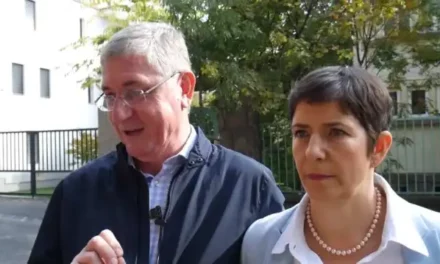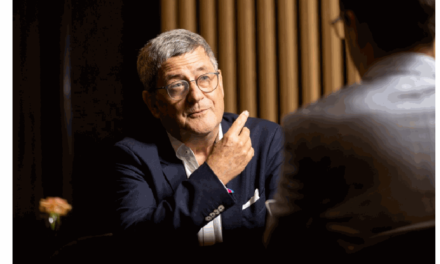However, those looking for a solution are in the minority compared to the determined supporters of complete victory and the continuation of the war, so the war will continue with enormous human and material sacrifices.
Who doesn't want to know, especially this early in the year, what the future holds? That was my job for decades, well, I wasn't a fortune teller, just a long-term planner who had to figure out what was going to happen in the next fifteen or so years. I wasn't alone, I'm not just thinking of office colleagues in the early 70s, when the year 2000 was still so far away, it's as if we were discussing what the world would look like in 2050, there were many famous institutions that dealt with the same question . Such was the case, for example, of the famous American Hudson Institute, whose director, Herman Kahn, was rumored to have an IQ of 200 (genius starts at 160), and indeed, if he wrote his book 55 years ago, A 2000 re-reading The Year 2000, we find surprisingly current topics in it, including the waste of goods in developed societies, or what he writes about a possible nuclear war. At the same time, the Club of Rome's book Limits to Growth was published, which predicted the end of exponential growth and the exhaustion of resources (especially oil) by the year 2000. As we know, this did not happen, but the issues raised in it, the limits of economic growth itself and the accompanying environmental destruction are still current topics of debate today.
At the moment, however, people are not so excited about 2050, but about what the year 2023 will bring, including the Russian-Ukrainian war. Here again, it is worth relying on American visionaries, not because we ourselves do not have enough imagination, but because world politics is controlled to a large extent by the United States, so it is good to pay attention to what the newspapers of the American liberal elite and the most influential of American foreign policy say. Papers of the Council on Foreign Relations.
In Time magazine, we can read that cornered Russia is turning from a global player into the world's most dangerous state, posing a serious and pervasive threat to Europe, the United States and beyond. Stuck in Ukraine, Russia, which has little to lose in terms of further isolation and Western retaliation, will resort to asymmetric warfare against the West, faced with intense internal political pressure to show off its power. Kremlin-linked hackers will launch increasingly sophisticated cyberattacks against Western companies, governments and infrastructure. By systematically supporting and funding disinformation and extremism. Russia will step up its offensive against Western elections.
According to Foreign Policy, the war has been disastrous for Russia so far, Russia has achieved the opposite of its goals, fueled Ukrainian nationalism, pushed Kiev closer to Europe, and gave new meaning to the previously adrift NATO. The accession of Finland and Sweden to the alliance will dramatically change the balance of power in Northern Europe and more than double the length of Russia's shared borders with NATO states. The war exposed the weaknesses of the Russian military, and in the West it revealed a determination and competence that could make the fiascos in Afghanistan, Iraq and Libya forget.
The paper also draws attention to the fact that the international isolation of Russia and Iran by the West resulted in these two countries becoming closer than ever. Although Russia has had conflicts with Iran in the past, it has already maintained partnership relations with the West, and now the war in Ukraine has made Iran one of Russia's most important foreign partners. Iran supplies Russia with vital military equipment, primarily drones, while Iran may receive high-tech weapons such as Su-35 fighter jets or the advanced Sz-400 air defense system from Russia. According to American officials and regional experts, the deepening of relations between Moscow and Tehran could prolong the bloody war in Ukraine and even endanger American allies in the Middle East against Iran.
While most of the analysis predicts the escalation of war, there are also articles that analyze the possibility of peace. Vladislav Zubok, a professor at the London School of Economics, analyzes the conditions under which the war could be ended in the columns of Foreign Affairs. As a start, he refers to a recent statement by General Mark Milley, chairman of the US Joint Chiefs of Staff, that the war in Ukraine cannot be won by military means alone, and now that Ukraine is in a strong position, peace talks must be considered, otherwise it will happen like in the First World War: the rejection of early peace will lead to a prolonged war and huge casualties. In this regard, Zubok notes that General Milley's views challenged not only Kiev's position, but also that of many of its Western supporters, including Poland, the Baltic states, North America and the United Kingdom, which support Ukraine's pursuit of a total military victory.
According to Zubok, Russia is stronger than many people think. Its military, economy and leader all seem stable, the majority of Russians still support the Russian government and refuse to accept defeat. Many confidently predicted that Russian trade and industry would be crushed by Western sanctions, but despite Western pressure, Russia is still able to finance its war machine, so the result could be a bloody stalemate. Instead, a path could be chosen that, after accepting certain territorial concessions on the part of Ukraine (primarily Crimea), creates peace in a way that respects the sovereignty and integrity of both Ukraine and Russia. Outside of NATO, a framework should be convened that ensures Russia's place in the European security architecture. This would be nothing more than a rethinking of Gorbachev's idea of a "common European home", the creation of a system of relations characterized by rapprochement rather than deterrence.
However, those looking for a solution are in the minority compared to the determined supporters of complete victory and the continuation of the war, so the war will continue with huge human and material sacrifices, and today no one can be sure whether it will not eventually turn into a nuclear war between NATO and Russia. It is worth re-reading Herman Kahn's explanations about this. (In parentheses, let's add that two-thirds of the Ukrainian population opposed NATO membership, which is why this war is going on now.)
We Europeans are, of course, primarily concerned and interested in the Russian-Ukrainian war, but let's also mention some other developments expected in the future, at least as seen by America's leading circles. According to Time magazine, Xi Jinping now dominates China's political system to a degree not seen since Mao, and there are few limits to how he can advance his state-centric and nationalist political agenda. Xi's nationalist views and assertive foreign policy will increasingly provoke opposition from the West and China's neighbors. James Crabtree, Foreign Policy columnist and Asia executive director of the International Institute for Strategic Studies, also sees that despite the positive tone of the Biden-Xi meeting, US-China relations will deteriorate. Washington is preparing a series of new economic and military measures, supplying arms to Taiwan, and deepening economic and military cooperation with Indo-Pacific partners including Australia, India and Japan, which China is sure not to take kindly to.
The world is increasingly divided into two economic and military blocs, which are now led by America and China. The geopolitical reorganization has hit global companies hard, and now, according to the Foreign Policy article, they are trying to move their companies that had been installed in China to other, friendlier countries, such as Vietnam. Does anyone still remember the two million dead in the Vietnam War and that the reason for the American attack was a lie, as in the case of Iraq?
After all, the leading analysts of American foreign policy do not paint the sky too rosy, but they are certainly better informed than we are. Of course, things can turn out more favorably, but as we said at the Planning Office at the time (when the country was already up to its neck in debt), only our pessimism is well-founded.
Author: Károly Lóránt, economist, advisor to the National Forum, member of the C12 expert group
Source: Magyar Hírlap
Photo: Pixabay












